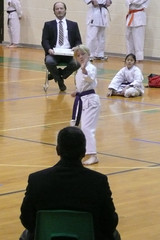Fast Fitness - Concentration Training
Friday, March 26, 2010
Jolie Bookspan, M.Ed, PhD, FAWM
Reader Paul J wrote me after sending in his Plank Chess success story:
"Side note on plank and thinking. I have been trying to recite a kata narration (the moves of a karate sequence) from memory during a plank and find it incredibly difficult to concentrate. At first it was just plan different and difficult, now it seems to get difficult after 30secs. (the memory verbal part) It’s like I can feel my brain trying to multitask, and misfiring.
"I suppose this is a type of stressful concentration training and is good for the brain. Makes me wonder what other psychological/physiological benefits there may be."
Speaking a sequence or other specific chain of events at the same time as directing your body to do unrelated sequences requires a collection of concentration and focus.
- Hold a plank
- Recite the directions to your school or workplace, the steps of your martial arts forms, or other sequences
- While still holding your plank, recite the steps backward
 It takes intense practice before physical movements become automatic while mental focus is directed separately. This is a fun, wise, important, and functional thing to practice and train. Training automaticity is never an excuse to text and drive. The difficulty of this training drill demonstrates why it results in so many accidents.
It takes intense practice before physical movements become automatic while mental focus is directed separately. This is a fun, wise, important, and functional thing to practice and train. Training automaticity is never an excuse to text and drive. The difficulty of this training drill demonstrates why it results in so many accidents.Coming soon: Taking this to the next step for more physical concentration training
Related Fitness Fixer:
- Which Ancient Exercise Gives Focus and Concentration?
- Is Bad Martial Arts Good Exercise?
- Sunlight Needed for Physical and Mental Health
- Sedentary Lifestyle Linked to Teen Emotional and Behavioral Problems
- Fast Fitness - Improving Mental Fitness Through Language Study
---
Read success stories and send your own.
See if your answers are already here - click Fitness Fixer labels, links, archives, and Index.
For personal medical questions - Replies to Medical Questions.
Limited Class space for personal feedback. Top students may earn certification through DrBookspan.com/Academy. More fun in Dr. Bookspan's Books.
Read success stories and send your own.
See if your answers are already here - click Fitness Fixer labels, links, archives, and Index.
For personal medical questions - Replies to Medical Questions.
Limited Class space for personal feedback. Top students may earn certification through DrBookspan.com/Academy. More fun in Dr. Bookspan's Books.
Labels: children, fast fitness, martial arts, mind, readers inspiring story

3 Comments:
At Monday, March 29, 2010 11:37:00 AM, Anonymous said…
Anonymous said…
Hey Dr. Bookspan,
I've purchased a majority of your books and they are excellent. One topic you don't seem to give specific time to is over-training, especially as it relates to weight-training. What is your view on this? Can you dedicate a specific blog to this topic?
At Monday, March 29, 2010 1:57:00 PM, Jolie Bookspan, M.Ed, PhD, FAWM said…
Jolie Bookspan, M.Ed, PhD, FAWM said…
Dear Hey, Glad you like the books.
Chapter 10 of my book Health & Fitness THIRD edition - How To Be Healthy Happy and Fit For The Rest Of Your Life is "Soreness, Overuse, and Misuse" - explaining overtraining and misuse confused for overtraining, DrBookspan.com/books. Pages 126-132.
There is some minor discussion of what constitutes overtraining in the comments of
Swimming and Pulmonary Edema Part II.
At Tuesday, March 30, 2010 10:46:00 AM, Asim said…
Asim said…
Thank's for the reference!
I guess I missed it :-) I actually have that book as well, but I don't pay as much attention to it. I like meat too much :) I also spend way more time on Healthy Martial Arts, The Ab Revolution, Stretching Smarter Stretching Healthier, and Fix Your Own Pain....
I'll be sure to check those pages out.
As an aside, I have a question?
I am an avid lifter. It seems that years of lifting encouraged plenty of bad habits that I am now trying to correct. Progress is slow, but definitely worth while.
The problem is I just twisting my neck muscle doing pull-ups. The pull was rather strange, because I was actually quite conscious over my posture, keeping chin in, without craning my neck and I have been stretching avidly as a result of your work. I have been practicing your pectoral stretch and trapezius stretch for awhile.
Because of this strain, I did some hunting and realized I laid off the serratus exercises and shoulder movements you refer to.
In Fixing Pain, I noticed that you made a comment that many people you see don't have flexibility issues, but are tight in the shoulder because of the lack of mobility. I've noticed that this seems to be my problem and may have been contributing to my neck straining easily. After doing some of these movements, also taking your advice to keep moving after injury instead of absolute rest, it seems my shoulders are a lot more lose as well as my neck seems to be better. Performing these mobility exercises, I notice a lot of popping, like my muscles are being unwound. The more I perform these movements, the less the popping becomes. What exactly is this popping and why was it happening so much?
Is it possible that this lack of shoulder mobility was contributing to my neck straining so easily, despite my flexibility being decent?
Also, the movements you stress for shoulder mobility, seem to round the shoulders as well. How is this different than the rounding of shoulders at one's desk all day?
Post a Comment
<< Home